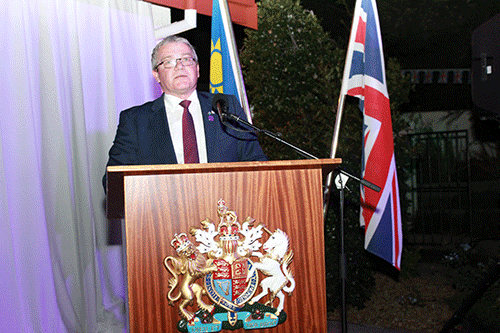The United Kingdom’s High Commissioner to Namibia, Charles Moore, feels corporation between the United Kingdom and Namibia enables the exchange of views on a wide range of international and domestic issues to work together for increased bilateral trade and investment.
He noted the relationship further provides support for education, collaboration on issues of international crime and learning from one another.
Moore said this during the reception of the Queen of England’s Platinum Jubilee in the capital on Friday.
Queen Elizabeth II marked her 70th year since her accession to the throne on 6 February 1952.
“The Trade Forward Southern Africa programme is playing an essential role in preparing Namibian businesses to export their products, promoting opportunities for women’s economic empowerment, and showcasing Namibian goods on the global platform,” said Moore.
He said, on trade and investment, the UK works closely with the Namibia High Commission in London, the Namibian Investment Promotion and Development Board (NIPDB), the Namibia Chamber of Commerce and Industry, and others to promote and exploit bilateral trade and investment opportunities.
“We have introduced a number of UK companies to the market over the past year, and we are keen to find more opportunities as we both begin to recover from the economic impact of Covid-19,” he highlighted.
The UK supported Namibia’s efforts and continues to tackle the Covid-19 pandemic by providing an Emergency Medical Team in August last year and donating 60 000 doses of Astra-Zeneca vaccines earlier this year, with a further donation expected to arrive shortly.
On education, the UK provides Chevening Scholarships to outstanding students who are future leaders in their chosen fields.
“Since Namibian independence, we have sponsored over 130 Chevening Scholars from Namibia, with 15 currently studying in the UK,” shared Moore.
The UK also backs Namibia’s efforts to tackle international criminal activity, such as the illegal wildlife trade, narcotics and people trafficking as well as cybercrime.
“Domestic issues include social challenges such as gender-based violence, teenage pregnancy and underage marriage, corruption, LGBTQI+ or gender equality. We support Namibia’s activities on such issues through small projects and workshops, often in partnership with the Civil Society and NGOs.
The UK also has challenges with GBV, teenage pregnancies and corruption, and we have a smaller percentage of female parliamentarians than Namibia, so we can learn from Namibia’s experience too,” he said.
At the same occasion, international relations deputy minister Jenelly Matundu said Namibia and the United Kingdom continue to enjoy excellent bilateral relations.
“Various development co-operation programmes are supported by the Department of International Development (DFID) and the British Council.
With our mutually beneficial friendship and ongoing cooperation in various fields, our two countries will be able to achieve the desired Economic Development Goals,” stated Matundu.
She added: “Namibia remains very grateful to the government and the People of the United Kingdom for the generous donations of PPEs and Covid-19 equipment you have facilitated in the past year, as well for having sent an emergency medical team from the UK, which assisted us at the height of the previous Covid-19 pandemic wave”. – psiririka@nepc.com.na


